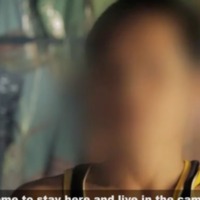
Ko Wunna
Foreign workers constitute more than 20 percent of the Malaysian workforce and typically migrate voluntarily—often illegally—to Malaysia from Bangladesh, India, Nepal, Burma, Indonesia, the Philippines, and other Southeast Asian countries, mostly in pursuit of better economic opportunities. Some of these migrants are subjected to forced labour or debt bondage by their employers, employment agents, or informal labour recruiters when they are unable to pay the fees for recruitment and associated travel. Ko Wunna is a 28-year-old resident of Burma's former capital, Rangoon, who was trafficked to Malaysia by gangs importing illegal workers in a constantly revolving racket in which, former participants say, the Malaysian police are also complicit. Here, Ko Wunna about his experiences over three months working for a trafficking gang in the region in and around northern Malaysia's Kedah province, which borders Songkhla and Yala provinces in Thailand. He reveals that illegal migrants who don't come under the aegis of one gang are vulnerable to worse exploitation by others.

Cho Cho
The internal migration of Chinese people seeking work has created an opportunity for human traffickers in China. Moreover the gender imbalance caused by the One Child Policy and the cultural preference for male children, has caused a shortage of women which has led to the trafficking of women to be sold as brides. As a result many women find themselves either deceived by promises of employment, sold or abducted and forced into marrying Chinese men who have paid for them. Women and girls are kidnapped or recruited through marriage brokers and transported to China from Africa, Asia and North Korea where some are subjected to commercial sex or forced labor. Cho Cho, who was 18 and married, was selling the betel nut chew so popular with Burmese men when a man from her neighborhood approached her with the promise of a job in Mandalay. However, instead of a job, Cho Cho found herself on a truck bound for China and upon arrival, was sold to a Chinese man to be married. After refusing to marry the man that bought her, Cho Cho was forced to work as a labourer. She was finally able to escape to the police who deported her back to Burma.

Aye Aye
The internal migration of Chinese people seeking work has created an opportunity for human traffickers in China. Moreover the gender imbalance caused by the One Child Policy and the cultural preference for male children, has caused a shortage of women which has led to the trafficking of women to be sold as brides. As a result many women find themselves either deceived by promises of employment, sold or abducted and forced into marrying Chinese men who have paid for them. Women and girls are kidnapped or recruited through marriage brokers and transported to China from Africa, Asia and North Korea where some are subjected to commercial sex or forced labor. Aye Aye was a 16-year-old housekeeper in Myanmar (Burma) helping her widowed father and two brothers, earning a dollar a day, when her boss offered her a better life and a U.S.$90-a-month job on the border with China. However, rather than a better job Aye Aye was sold in to marriage with a Chinese man and was subjected to daily beatings by his family.

Saw Pol Lu
The UN has estimated that the number of refugees, asylum seekers and internally displaced people around the world has topped 65 million. Many of these people live in refugee camps across the globe. In Myanmar (Burma), thousands of people have fled civil war and found themselves confined to refugee camps in Thailand where they are vulnerable to human trafficking. In an attempt to provide for their families, refugees are lured for employment in Thailand and Malaysia then sold to employers as forced labourers. Saw Pol Lu fled Myanmar (Burma) to escape the civil wars and now lives in Mae La refugee camp along the Thai boarder. Here the widespread corruption and failed Thai policy led Saw Pol Lu, along with thousands of other refugees, in to the hands of human traffickers. Saw Pol Lu tells of the conditions and dangers faced by Burmese refugees in Thailand.